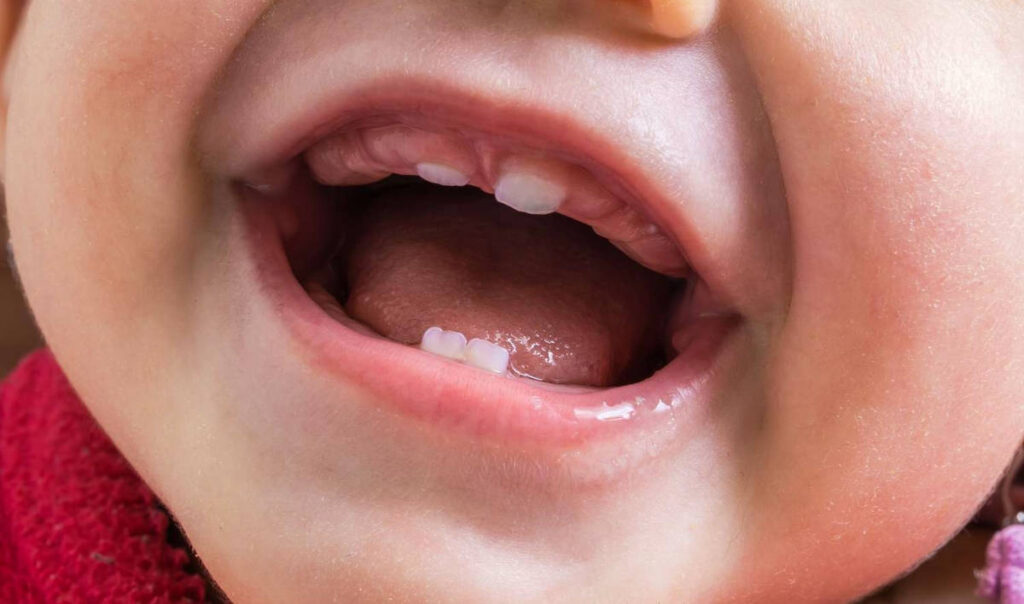As your little one grows, they’ll soon begin to experience the natural baby’s teething process – and while it isn’t dangerous or serious for most babies, it can be uncomfortable.

That’s why we’ve compiled a helpful guide with valuable information about what to expect during this transitional time so you know how best to support them on their journey.
What is Baby’s Teething Process?
As babies grow, they go through the exciting milestone of teething – when their first teeth start to poke through. Typically taking place between 6 and 24 months old, it usually begins with the bottom front teeth before moving onto top fronts and then molars. Although parents may find these few weeks a trying experience due to soreness or discomfort caused by the baby’s teething process, this is an essential part of baby development!
Signs and Symptoms of Teething
Taking care of a teething baby can be an exhausting experience. Be sure to keep your eyes open for several telltale signs that could indicate they’re grinding their gums – like increased drooling, crankiness, and wanting to chew on anything they can get in their mouths! Here are some more signs of teething:
- Increased drooling
- Chewing or gnawing on objects
- Irritability or fussiness
- Difficulty sleeping
- Loss of appetite
- Swollen or tender gums
- Ear pulling or rubbing
- A low-grade fever
Every little one is unique, some developing typical signs of teething and others not displaying a single symptom – that’s okay too!
How can I Help my Baby?
Baby’s teething process can cause a lot of distress for babies, but there are many things you can do to make them more comfortable. Providing items that they may safely chew on is one way – like teethers or other soft toys – as well as gently massaging their gums with your finger. If the discomfort persists past 6 months old, giving an over-the-counter pain reliever such as acetaminophen or ibuprofen – while paying close attention to instructions on labels – could help bring some ease and relief too!
Experiencing teething pains can be both uncomfortable and frustrating for your baby. Thankfully, there are a few techniques that you can use to provide comfort during this process – from freeze-dried fruits or frozen purees as snacks to consulting with your pediatrician about other potential home remedies. With careful consideration of the safety of these methods, you’ll soon have them smiling in no time!
Every day, parents can provide comfort and relief to their little ones by simply rubbing the gums with a gentle finger. This simple gesture helps soothe babies in moments of discomfort.
Tired of hearing your baby’s cries? Try giving them something to chew on like a teething ring or cool, damp cloth- guaranteed to provide instant relief!
If you have a teething baby, it may be time to consider over-the-counter medications. Both infant ibuprofen and acetaminophen can provide relief for your little one – just make sure to follow the dosage instructions carefully!
If you’re a parent looking for relief and comfort during the baby teething season, there are many products to consider. Here’s the rundown of some popular brands:
TeethingBliss

Teething can be an uncomfortable experience for babies, but this company offers a range of products to make teething easier. From small droplets and tablets designed specifically for little ones, to rubber rings perfect as a baby’s first toy – they have it all!
Ways to Ease Your Baby’s Discomfort
- For a soothing distraction, offer your baby something cold to chew on. A wet washcloth or chilled teething toy will help numb the gums and reduce discomfort associated with teething.
- For teething babies, a gentle massage or a specially designed teething ring can help ease their discomfort and provide much-needed relief.
- Are you worried about your little one’s pain and discomfort? Speak to your pediatrician today for relief options, such as acetaminophen or ibuprofen.
- Need a distraction for your little one? Providing them with some new entertainment or stimulating activity can be an effective way to take their mind off any pain and discomfort.
When should I call the doctor?
Teething is a normal part of every baby’s development – and while most babies experience just minor discomfort, it can sometimes lead to complications. Ludwig’s angina – an uncommon bacterial infection – causes severe swelling in the throat which makes breathing difficult; fever or diarrhea may also occur. If your little one is having excessive drooling, difficulty sleeping, or seems extra uncomfortable due to teething pain don’t hesitate to contact their doctor! Keep in mind that as long as you keep them comfortable with treatments like chilled items for gnawing on and Tylenol if needed (always consult your pediatrician first!), then this natural process will pass without any medical intervention required.
Conclusion
Teething is an exciting milestone for babies and parents alike! Although it can be a difficult period of development, understanding what to expect during the teething process as well as strategies for easing discomfort will ensure your little one stays comfortable. If at any time you have questions or concerns about their symptoms, don’t hesitate to speak with your pediatrician – they’re here to help!
Reading Suggestions:


